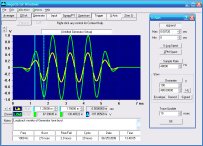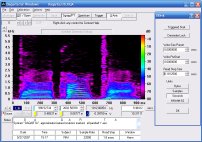![[LogoShip]](logo5.png)
Software for Windows
Science with your Sound Card!


Features:
Oscilloscope
Spectrum Analyzer
8-Channel
Signal Generator
(Absolutely FREE!)
Spectrogram
Pitch Tracker
Pitch-to-MIDI
DaqMusiq Generator
(Free Music... Forever!)
Engine Simulator
LCR Meter
Remote Operation
DC Measurements
True RMS Voltmeter
Sound Level Meter
Frequency Counter
Period
Event
Spectral Event
Temperature
Pressure
MHz Frequencies
Data Logger
Waveform Averager
Histogram
Post-Stimulus Time
Histogram (PSTH)
THD Meter
IMD Meter
Precision Phase Meter
Pulse Meter
Macro System
Multi-Trace Arrays
Trigger Controls
Auto-Calibration
Spectral Peak Track
Spectrum Limit Testing
Direct-to-Disk Recording
Accessibility
Data Logger
Waveform Averager
Histogram
Post-Stimulus Time
Histogram (PSTH)
THD Meter
IMD Meter
Precision Phase Meter
Pulse Meter
Macro System
Multi-Trace Arrays
Trigger Controls
Auto-Calibration
Spectral Peak Track
Spectrum Limit Testing
Direct-to-Disk Recording
Accessibility
Applications:
Frequency response
Distortion measurement
Speech and music
Microphone calibration
Loudspeaker test
Auditory phenomena
Musical instrument tuning
Animal sound
Evoked potentials
Rotating machinery
Automotive
Product test
Contact us about
your application!
DAT File Format Dialog
Controls: DD/Open >> DAT Format
This dialog appears whenever you attempt to open any file that Daqarta determines is not a valid .DQA or .WAV file, regardless of its actual extension. Daqarta calls such files .DAT files.
Since Daqarta can't read the format from the file itself, this dialog allows you to specify it manually. If the file actually has a header preceding the data (though one which Daqarta doesn't understand), you can tell Daqarta how many header bytes to skip. Otherwise, the entire file is treated as headerless raw data.
Please note: While the DAT File Format dialog is open, all toolbar buttons are disabled. You must either dismiss the dialog (via Cancel, [X], or the Escape key) to abandon the file load, or hit OK to proceed with the changed or default dialog settings.
Once you specify the data format, Daqarta will dutifully use it when opening the file. If you see what appears to be garbage, you can try opening the same file again with a different format.
The .DAT options allow you to view the contents of files that were created on other systems with incompatible or even unknown formats. Once you have the proper format, you can then save a copy as a .DQA or .WAV file that Daqarta understands, or as a .TXT file for some other program, and you won't need to use the .DAT dialog in the future. If the file is longer than 1024 samples per channel, only the current 1024 samples will be saved.
(Alternatively, you can create a custom macro to convert all of a longer .DAT file into .DQA, .WAV, or .TXT using file operations on Macro Arrays. See the WAV File Stereo-to-Mono Macro for a general approach to file conversion.)
Note that Arb and Play files for use with the Daqarta Generator may also be .DAT files, but since they must be able to be loaded automatically from the .GEN setup they are always assumed to be mono signed 16-bit format by default.
If you have some other format that you wish to use for Arb, open it as a data file, set the proper format in the .DAT dialog, and save a copy as a .DQA or .WAV file for later loading by Arb. Since you can only save files of 1024 samples per channel this way, the method is not useful for Play.
Arb and Play files may only be Mono or Stereo, though you can have 4-Chan or 8-Chan .DAT for normal data files.
- Bits (8, 12 Low, 12 High, 16)
- Format (Signed, Unsigned)
- Invert
- Channels (Mono, Stereo, 4-Chan, 8-Chan)
- Sample Rate
- Decimate X
- Skip Header Bytes
See also File Menu, Open Existing Data File
- Back to Copying, Moving, or Deleting Files
- Ahead to DAT Bits (8, 12 Low, 12 High, 16)
- Daqarta Help Contents
- Daqarta Help Index
- Daqarta Downloads
- Daqarta Home Page
- Purchase Daqarta
Questions? Comments? Contact us!
We respond to ALL inquiries, typically within 24 hrs.INTERSTELLAR RESEARCH:
Over 35 Years of Innovative Instrumentation
© Copyright 2007 - 2023 by Interstellar Research
All rights reserved